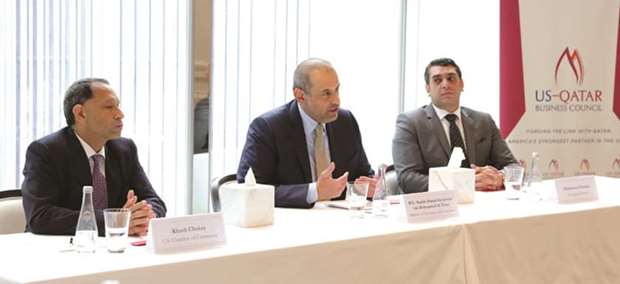Qatar’s foreign trade has shown remarkable growth, increasing by 16% in 2017, said HE the Minister of Economy and Commerce Sheikh Ahmed bin Jassim bin Mohamed al-Thani.
Qatar’s total exports also increased by 18%, contributing to a total trade surplus of 49%, he said while chairing a roundtable with businessmen during a working lunch on the sidelines of Qatar’s participation in the 73rd session of the United Nations General Assembly in New York on Monday.
Sheikh Ahmed said international trade and investment form a key part of Qatar’s future growth and diversification, adding that the US is one of Qatar’s most valued and largest global partners.
The US and Qatar are bound by several agreements and memorandums of understanding, especially the TIFA Agreement, which led to the establishment of a joint council since 2004.
On bilateral trade, Sheikh Ahmed said $24bn worth of goods were traded in the last five years; 84% of the trade balance was in favour of the US.
The US is also Qatar’s top destination for imports with 16% of Qatar’s imports coming from the US in 2017.
Financial transactions from Qatar to the US reached $26.5bn in 2017 alone, including business profit, salaries, and payments.
Qatari investments in the US have also exceeded $45bn, the equivalent to 23% of Qatar’s GDP, he said.
Qatar Airways alone provided a $92bn boost to the US economy through the purchase of some 332 American aircraft, a deal that supports more than 527,000 direct and indirect jobs in the US.
More than 650 American companies are established in Qatar, including 117 companies 100% owned by US citizens, the Minister noted.
In addition, more than 15,000 American citizens live in Qatar, where 5,000 highly skilled individuals are currently working in the private sector, he said.
Qatar, Sheikh Ahmed said, “achieved positive growth rates” last year, noting that Qatar’s real GDP grew by 1.6% at constant prices.
Numerous international reports have indicated the strong performance of the Qatari economy. Quoting the latest report released by the World Bank, the Minister said Qatar’s real GDP growth was expected to rise to 2.8% in 2018.
Qatar’s inflation rates have also dropped to about 0.5% in 2017 compared to 2.7% in 2016.
All these “positive” indicators, according to the Minister, point to the fact that “Qatar has overcome the siege by enhancing its economic competitiveness and cementing its position as an attractive destination” for US investments.
Qatar’s economy depends mainly on the oil and gas sector, despite the fact that the government’s economic policies have contributed to an increase in the contribution of non-oil sectors to about 51.8% of GDP last year.
The Minister touched upon measures that Qatar has taken to overcome the “unjustified siege” imposed on the country, which was aimed at undermining its position, but he said Qatar “emerged stronger and more independent” than ever before.
Qatar has “successfully” established direct commercial routes with a number of strategic hubs around the world, diverting trade to its major trading partners.
The country has sought to take advantage of the “excellent” business environment and investment opportunities available in Qatar to create a sophisticated air fleet operated by Qatar Airways.
Qatar has sought to mobilise its signed regional agreements with Kuwait, Iraq, Oman, Turkey, Pakistan, India, Azerbaijan and Central Asia to expand its trade activities by establishing a sea fleet that connects Qatar with its major trading partners in the world, targeting a market of 400mn population in its first stage. The legislative framework regulating foreign investments in Qatar offer foreign investors the opportunity to own up to 100% of investment projects in various sectors, the Minister said, noting that the Free Zones Law allows 100% ownership across many activities and sectors.
Qatar also offers investors “numerous” incentives including the freedom to transfer capital and choose the legal entity of a project in addition to exempting assets and production requirements as well as exports and imports from taxes and duties, which would streamline the flow of goods and services to and from Qatar.
Qatar has established a single window, where investors can obtain all required licenses, which only require the approval of the Free Zones Authority.
Sheikh Ahmed stressed Qatar’s “firm commitment” to strengthening its position as a regional business hub, highlighting the country’s success in establishing direct trade lines with a number of strategic partners around the world.
In this context, the Minister called upon the American business community to benefit from Qatar’s strategic geographical location, advanced infrastructure and investment and legislative environment. Qatar will continue to honour its agreements and international conventions.
Qatar’s private sector is also playing an important role, the Minister said, noting that the country is currently working on a public-private partnership law that will contribute to supporting this sector and foreign investors in the Qatari economy.
Sheikh Ahmed also pointed to Qatar’s sustainable economic policies and its ability to consolidate its position as a regional business hub”.
Qatar welcomes US investors who may benefit from the promising investment opportunities offered by the Qatari economy, which is one of the fastest growing regional economies, he said.
Sheikh Ahmed also participated in the reception hosted by South African President Matamela Cyril Ramaphosa to celebrate the centennial of late president Nelson Mandela.
The roundtable, which was organised by the Embassy of Qatar, US-Qatar Business Council and the US Chamber of Commerce, brought together Khush Choksy, senior vice president, American Chamber of Commerce for Middle East affairs; Mohamed Barakat, US-Qatar Business Council managing director and Sheikh Meshal bin Hamad al-Thani, Qatar’s ambassador to the US. Page 16

HE Sheikh Ahmed addresses a roundtable with businessmen during a working lunch on the sidelines of Qatar’s participation in the 73rd session of the United Nations General Assembly in New York on Monday.
